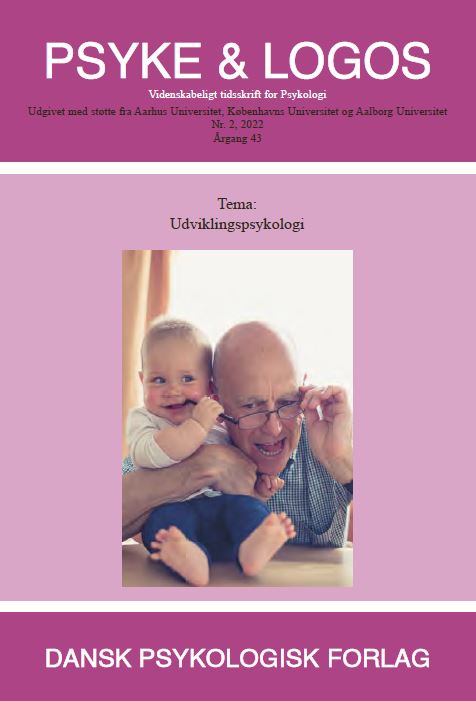Lad os udvikle en psykologisk udviklingsvidenskab
DOI:
https://doi.org/10.7146/pl.v43i2.137301Nøgleord:
Udvikling, udviklingsvidenskab, økologisk psykologi, Glen Elder Jr., Roger G. Barker, nyliberalisme, ny udsathed, livsforløbs-teori, livsverden, behavior setting teoriResumé
Psykologien har et påtrængende behov for at blive en udviklingsvidenskab.
Under indflydelse af nyliberale samfundsforhold
kommer psykologien under pres. Effekt- og resultatparadigmet
kan føre til reduktion af det faglige perspektiv, så diagnosetænkning
og et snævert individfokus vinder indpas på bekostning
af en helhedsorienteret forståelse. Der tages afsæt i
problemet børns og unges stigende mistrivsel for at illustrere
psykologiens behov for selvrefleksion. Spørgsmålet er, hvilke
veje man kan gå for at vende den bekymrende udvikling. To
typer af kritik af (udviklings)psykologien diskuteres, nemlig 1.
kritik af statisk-kategoriel (udviklings)psykologi og 2. opgør
med udviklingspsykologien i form af antidevelopmentalismen.
Der argumenteres dernæst gennem to forskellige teoretiske
nedslag (Glen Elder Jr. og Roger G. Barker) for, at man med
fordel kan kigge i retning af den økologiske psykologi for at
finde inspiration til en fornyet udviklingsvidenskab.
Referencer
Ankerstjerne, M. (2022). Stor kortlægning af vores sundhed er ”nedslående læsning”
– især på ét område står det skidt til. https://www.tv2kosmopol.dk/lorryland/storkortlaegning-
af-vores-sundhed-er-nedslaaende-laesning-isaer-paa-et-omraade-staardet-
skidt-til.
Barker, R.G. (1964). Ecological units. I: R.G. Barker & P.V. Gump (red.), Big School, Small
School. High School Size and Student Behavior (s. 11-28). Stanford University Press.
Barker, R.G. & Wright, H.F. (1971). Midwest and Its Children. The Psychological Ecology
of an American Town. Archon Books.
Barker, R.G. & Gump, P.V. (1964). Big School, Small School. High School Size and
Student Behavior. Stanford University Press.
Barker, R.G., Midwest Psychological Field Station (1978). Habitats, Environments, and
Human Behavior. Studies in Ecological Psychology and Eco-Behavioral Science from the Midwest Psychological Field Station, 1947-1972. Jossey-Bass Publishers. Note: Artiklen er en gengivelse af: Barker, R.G. (1960). Ecology and motivation. I: M.R.
Jones (red.), Nebraska symposium on motivation (s. 1-50). University of Nebraska Press.
Burman, E. (2010). The child and childhood in feminist theory. Feminist Theory, 11(3),
-240.
Burman, E. (2011). Deconstructing neoliberal childhood: Towards a feminist antipsychological
approach. Childhood, 19(4), 423-438.
Burman, E. (2013). Desiring development? Psychoanalytic contributions to antidevelopmental
psychology. International Journal of Qualitative Studies in Education, 26(1),
-74.
Ejrnæs, M. (2019). Ingen er dømt til den sociale arv. I: A. Görlich, M. Pless, N. Katznelson
& L. Graversen (red.), Ny udsathed i ungdomslivet (s. 45-60). Hans Reitzels Forlag.
Elder, G.H., Jr. (1974). Children of the Great Depression. Social Change in Life Experience.
The University of Chicago Press.
Elder, G.H., Jr. (1996). The life course paradigm: Social change and individual development.
I: P. Moen, G.H., Jr. Elder & K. Lüscher (red.), Examining Lives in Context:
Perspectives on the Ecology of Human Development (s. 101-139). American Psychological
Association.
Giele, J.Z. & Elder, G.H., Jr. (1998). Life course research: Development of a field. I:
J.Z. Giele & G.H., Jr. Elder (red.), Methods of Life Course Research (s. 5-27). Sage
Publications.
Gump, P.V. (1978). Big schools, small schools. I: R.G. Barker (red.), Habitats, Environments,
and Human Behavior: Studies in Ecological Psychology and Eco-Behavioral
Science from the Midwest Psychological Field Station, 1947-1972 (s. 245-256).
Jossey-Bass Publishers.
Görlich, A., Pless, M., Katznelson, N. & Graversen, L. (2019). Ny udsathed i ungdomslivet.
Hans Reitzels Forlag. s. 248-49.
Harvey, D. (2005). A Brief History of Neoliberalism. Oxford University Press.
Hedegaard, M., Fleer, M. Bang, J. & Hviid, P. (2008). Studying Children. A Cultural-
Historical Approach. Open University Press.
Højholt, C. (2016). Situated inequality and the conflictuality of children’s conduct of life.
I: E. Schraube & C. Højholt (red.), Psychology and the Conduct of Everyday Life (s.
-163). Routledge.
Karpatschof, B. (1989). Galskaben, psykiatrien og virksomhedsteorien. I: M. Hedegaard,
V.R. Hansen & S. Thyssen (red.), Et virksomt liv – udforskning af virksomhedsteoriens
praksis (s. 104-20). Aarhus University Press.
Lewin, K. (1917/2009). The landscape of war. Art in Translation, 1(2), 199-209.
Lewin, K. (1935). Environmental forces in child behavior and development. I: K. Lewin
(1935) (red.), A Dynamic Theory of Personality – Selected Papers (s. 65-113). Mc-
Graw-Hill Book Company.
Rose, N. (2007). Powers of Freedom. Cambridge University Press.
Røn Larsen, M. (2016). ”May I please tell you a little anecdote?”: Inter-professional
decision-making about inclusion in the borderland between normal and special
schooling. The International Journal on School Disaffection, 12(1), 65-84.
Sundhedsstyrelsen (2021). Danskernes Sundhed – Den Nationale Sundhedsprofil 2021.
Valsiner, J. (1997). Culture and the Development of Children’s Action. A Theory of Human
Development. John Wiley & Sons, Inc.
Vygotskij, L. (1976). Tænkning og sprog. Hans Reitzels Forlag.
Warming, H. (2019). Tillid til systemet. I: A. Görlich, M. Pless, N. Katznelson & L.
Graversen (red.), Ny udsathed i ungdomslivet (s. 63-77). Hans Reitzels Forlag.
Downloads
Publiceret
Citation/Eksport
Nummer
Sektion
Licens
Ophavsret er tidsskriftets og forfatternes. Det er gældende praksis, at artikler publiceret i Psyke & Logos, som efterfølgende oversættes til andet sprog, af forfatteren frit kan publiceres i internationale tidsskrifter, dog således at det ved reference fremgår, at den oversatte artikel har et forlæg i en dansksproget version i Psyke & Logos. Artikler kan frit deles og linkes til på forsknings- og undervisningsnetværk (så som Blackboard). Link foretrækkes, fordi det giver oplysning om brug af tidsskriftets artikler.




